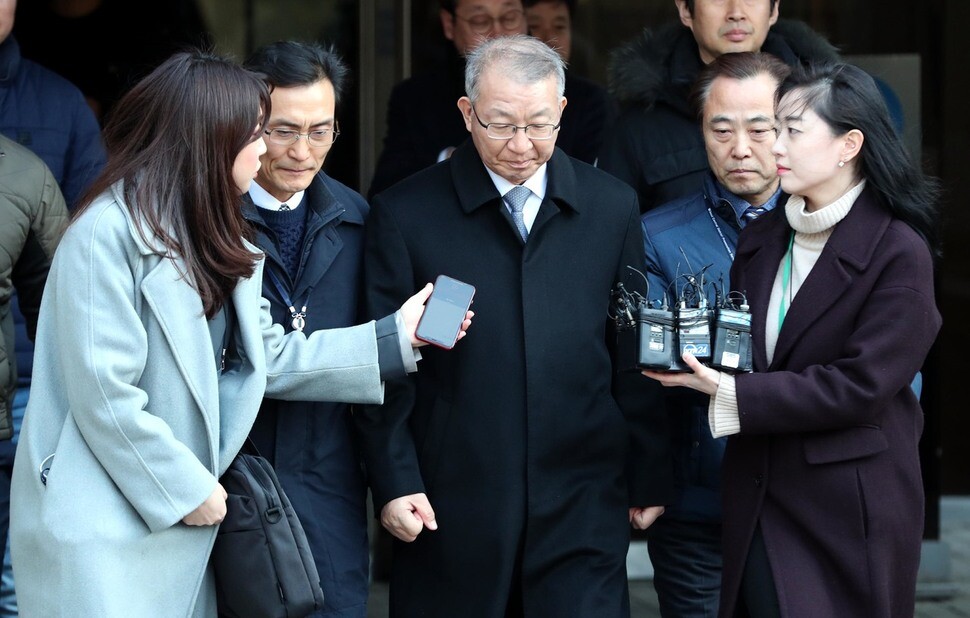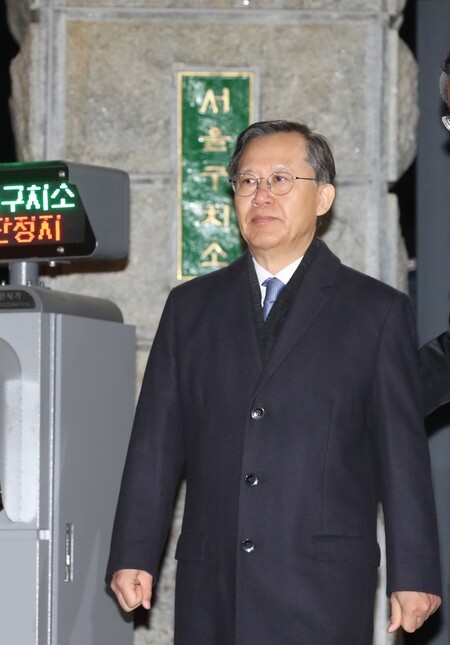hankyoreh
Links to other country sites 다른 나라 사이트 링크
Former Supreme Court Chief Justice Yang Sung-tae arrested

Former Supreme Court Chief Justice Yang Sung-tae, 74, was arrested early in the morning on Jan. 24.
With the arrest, a court held the last head of the judiciary ultimately accountable for a scandal that has eroded confidence in the court system. An investigation by prosecutors lasting over seven months and involving the questioning of over 100 current and former judges now enters its final stages as Yang is delivered for trial. The courts themselves once again hold the key to restoring faith in the judiciary.
Hon. Myeong Jae-gwon, a warrant judge with the Seoul Central District Court, deliberated for 10 hours after finishing his pre-arrest questioning (warrant validity review) around 4 pm the day before – the first ever such questioning of a former Supreme Court chief justice in the history of South Korea’s constitutional government.
“Evidence has been provided for a substantial portion of the criminal charges. The incident is also grave, and the circumstances of the investigation to date as well as the suspect’s status and relationship to the main figures involved indicate a risk of evidence destruction,” he concluded in granting prosecutors’ request for an arrest warrant. Yang, who was awaiting judgment from one of his juniors after 42 years of judging others from the bench, was subsequently incarcerated in prison clothes at the Seoul Detention Center in Uiwang, Gyeonggi Province.
Punishment of former chief justice unavoidable if faith in courts is to be restored
Even the prosecutors themselves seem not to have expected the so-called “bulletproof court” to issue an arrest warrant for a former Supreme Court chief justice. Its decision was based on the position that there was nowhere else to shift the blame from the chief justice himself, the highest-ranking figure in the judiciary with comprehensive authority to direct and oversee administrative affairs for the judiciary. The outcome appears to reflect widespread views in and around the court that punishment for the former head of the judiciary is unavoidable if tarnished confidence in the courts is to be restored.
The court also appears to have concluded that the criminal charges against Yang were amply proven in the command and reporting relationship among Yang, former Justice Park Byung-dae and Im Hong-heon, former National Court Administration deputy director, even if Park is taken out of the picture. In their supplementary investigation, prosecutors focused on securing evidence and testimony to show that Yang was responsible for specific actions rather than simply issuing orders. This included a work notebook kept by Lee Gyu-jin, which contained detailed records of Yang’s orders; a Kim & Chang document showing evidence that Yang met personally with legal representatives of a Japanese company to discuss delaying a trial in a suit requesting damages for forced labor during Japan’s colonial occupation of Korea; and a “problematic judges” document calling for prejudicial personnel treatment toward judges of particular political leanings.
Referring to the fate of Ahn Tae-geun, former prosecution bureau director– who was sentenced to two years in prison and taken into custody by the same court the same afternoon for his involvement in the prejudicial personnel treatment of one specific prosecutor – the prosecutors in Yang’s case argued, “The charges against Yang are even more serious, as they involved prejudicial treatment toward dozens of judges.”
Yang’s legal team claims evidence and testimony against him have been falsified

In court that day, Yang’s team reiterated its past claims that he was “merely conveying his thoughts and consideration as head of the judiciary regarding the ramifications of Supreme Court rulings” and had “exercised his rightfully appointed authority as Supreme Court Chief Justice.” In response to testimony from junior judges claiming to have received orders from Yang, the team reportedly claimed the accounts were “false testimony.” It even argued Lee Gyu-jin’s notebook could have been falsified after the fact, sources said. The result suggests Myeong saw the evidence and testimony presented by prosecutors as more credible than the claims from the former Chief Justice’s legal team.
In the very next courtroom, Hon. Heo Yeong-ho, a warrant judge, was conducting a pre-arrest questioning at the same time for former Supreme Court Justice Park Byung-dae, 62. Heo ultimately decided to reject the arrest warrant request, citing similar grounds to a previous dismissal last month.
“The evidence is inadequate to substantiate the major criminal charges, and in some cases there are grounds for questioning whether criminal charges are justified,” Heo said.
By Lim Jae-woo, Ko Han-sol and Jang Yee-ji, staff reporters
Please direct comments or questions to [english@hani.co.kr]

Editorial・opinion
![[Column] Season 2 of special prosecutor probe may be coming to Korea soon [Column] Season 2 of special prosecutor probe may be coming to Korea soon](https://flexible.img.hani.co.kr/flexible/normal/500/300/imgdb/original/2024/0426/3317141030699447.jpg) [Column] Season 2 of special prosecutor probe may be coming to Korea soon
[Column] Season 2 of special prosecutor probe may be coming to Korea soon![[Column] Park Geun-hye déjà vu in Yoon Suk-yeol [Column] Park Geun-hye déjà vu in Yoon Suk-yeol](https://flexible.img.hani.co.kr/flexible/normal/500/300/imgdb/original/2024/0424/651713945113788.jpg) [Column] Park Geun-hye déjà vu in Yoon Suk-yeol
[Column] Park Geun-hye déjà vu in Yoon Suk-yeol- [Editorial] New weight of N. Korea’s nuclear threats makes dialogue all the more urgent
- [Guest essay] The real reason Korea’s new right wants to dub Rhee a founding father
- [Column] ‘Choson’: Is it time we start referring to N. Korea in its own terms?
- [Editorial] Japan’s rewriting of history with Korea has gone too far
- [Column] The president’s questionable capacity for dialogue
- [Column] Are chaebol firms just pizza pies for families to divvy up as they please?
- [Column] Has Korea, too, crossed the Rubicon on China?
- [Correspondent’s column] In Japan’s alliance with US, echoes of its past alliances with UK
Most viewed articles
- 1‘We must say no’: Seoul defense chief on Korean, USFK involvement in hypothetical Taiwan crisis
- 2[Column] Season 2 of special prosecutor probe may be coming to Korea soon
- 3N. Korean delegation’s trip to Iran shows how Pyongyang is leveraging ties with Moscow
- 4Amnesty notes ‘erosion’ of freedom of expression in Korea in annual human rights report
- 5Korea sees more deaths than births for 52nd consecutive month in February
- 6[Reportage] On US campuses, student risk arrest as they call for divestment from Israel
- 7[Editorial] New weight of N. Korea’s nuclear threats makes dialogue all the more urgent
- 8‘Weddingflation’ breaks the bank for Korean couples-to-be
- 9Division commander ordered troops to enter raging flood waters before Marine died, survivor says
- 10[Editorial] Korea’s surprise Q1 growth requires objective assessment, not blind fanfare